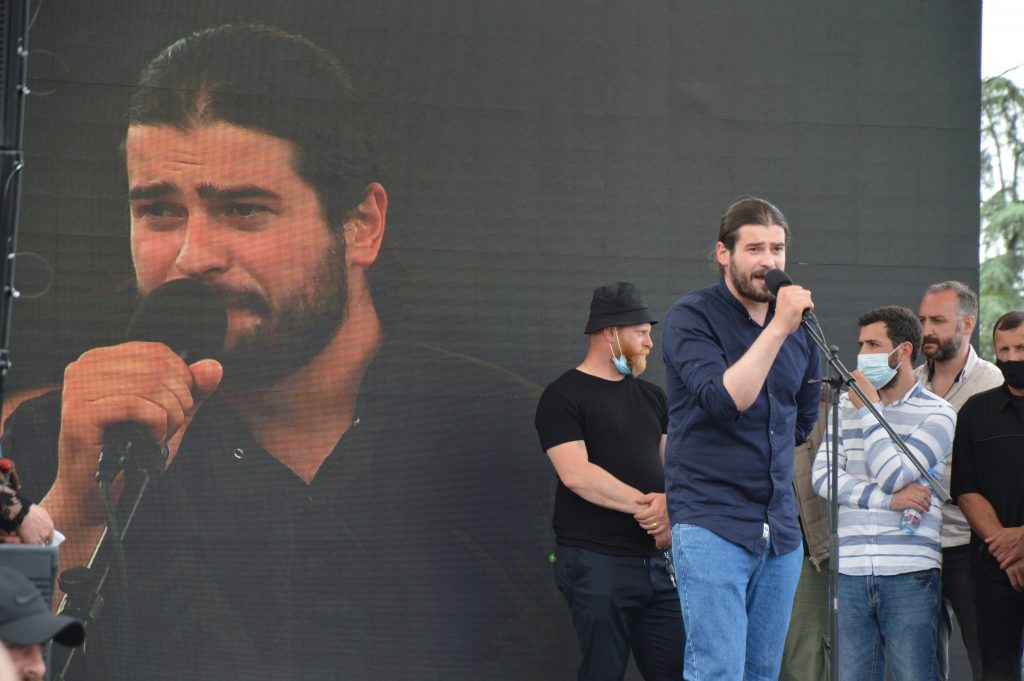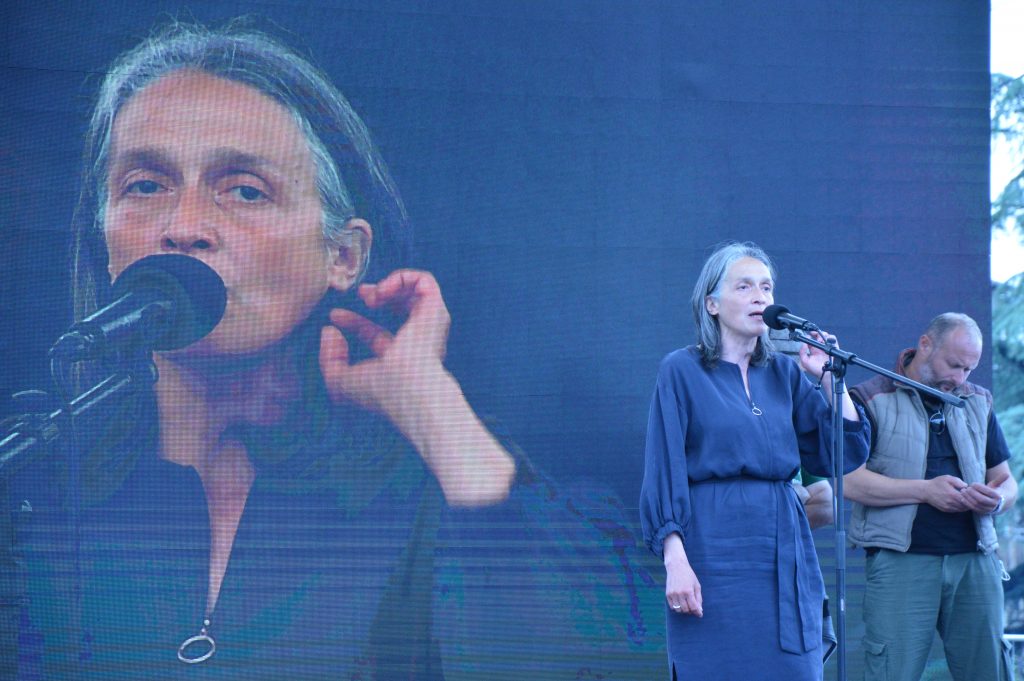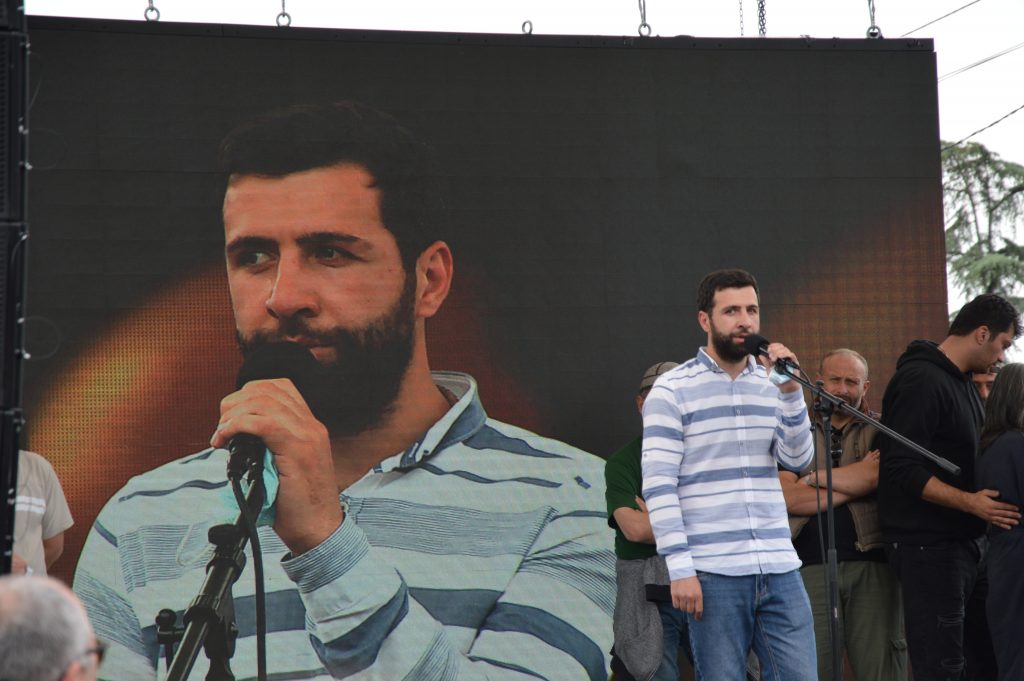Massive Protest Against Namakhvani HPP Underway in Tbilisi
The half-year-long protest against the construction of the Namakhvani Hydropower Plant project in western Georgia’s Rioni Valley has shifted to Tbilisi, as thousands from all across Georgia gathered at the capital city’s First Republic Square to voice their discontent with the controversial project.
Addressing the diverse protesting crowd, which encompassed Georgians from all sides of the left-right political spectrum, the 28-year-old protest leader, Varlam Goletiani reiterated earlier demands of terminating the government’s contract with Namakhvani HPP investor and the Enka Renewables company to leave the Rioni valley. Goletiani also said they are demanding the launch of criminal investigations against officials involved in drafting and signing the document, including Economy Minister Natia Turnava, and imposing a moratorium on similar projects until a coordinated energy policy is developed.
If the Government of Georgia does not meet the demands by noon tomorrow, “we will paralyze the capital city completely,” Goletiani warned.
“The fight begins here and now, and we will see it through until [the issue] is decided in favor of the people,” he said, calling on supporters to brace for long-term, “rational” and strategic efforts against the powerplant construction, and to pursue civic engagement and protests to hold the authorities accountable.

Noting that the resources for dialogue with the government have been exhausted, the activist said they are not aiming to make a revolution, but rather, intend to solve the concrete issue and exercise “control over the elected government as a civil society [group].”
Calling for unity among the diverse group of protesters, Goletiani said there will be no issue they cannot solve as long as they are not divided by the opposing side. We should stand at every protest center, where people are fighting for justice and their rights, Goletiani remarked.
Goletiani rebuffed allegations over their plans to set up a political party, noting that it would threaten the unity of their movement. He said entering the existing “system” as a party would bring no results for the cause, as the “system” is out of steps with the public demands. “Practically, there is an abyss between the population and political parties and we cannot find overlap and connection with those people, that are [supposed] to be reflecting on our problems.”
- CSOs Slam ‘Defamation Campaign’ Against Namakhvani HPP Opponents
- Namakhvani Protests Targeted in Discrediting Campaign ahead of Major Rally
“They sold out our land, people, the land that is the most precious thing for us,” addressed the crowd another protest leader Maka Suladze, the Rioni valley native resisting to quit her village and sell her property to the company. “It turned out after the contract [between the government and the investor] was publicized, that we are the children of the sold-out valley.”
Slamming the authorities over the restrictions of freedom of movement in the valley, Suladze said: “we have a checkpoint in the Rioni valley, and I cannot get to my house, to my [88-year-old] father unless I get prior approval from [police officials]… At my own land, in my own country, I cannot arrive at my own church… I encounter armed police.”

Another activist leader Marita Museliani said the Save Rioni Gorge movement had to resort to the “extreme demands,” like Minister Turnava’s resignation and investigation against her after the two dialogue efforts with the authorities proved unsuccessful.
Museliani reassured the crowd that the activists want the protest to remain calm, and do not plan to take measures such as “overthrowing the government,” if the authorities refuse their demands. “We do not want to take responsibility for a process that will get out of our hands,” she said.
Activists set up tents and plan to remain on the First Republic Square until the government makes its position known on their demands.
Enka Renewables, a company that is carrying out the Namakhvani HPP project, stated today in response to the rally that the company is ready to continue discussions with “any stakeholders.” But it maintained that the project “serves the well-being of Rioni Valley residents and the whole country.”
Borjomi, Chiatura, Ozurgeti protesters join the cause
In a show of solidarity, leaders of other ongoing protests and strikes across Georgian towns arrived at the rally to voice support for the Save Rioni Gorge movement and called for unity in resolving pressing social issues facing the protesters in the regions.
One of the striking workers at a major mineral water company Borjomi, which addressed the rally, said he joined in to support the anti-Namakhvani HPP activists in “the fight for justice.” “We must [all] unite,” he said.
Another leader, in the protest against Georgian Manganese, a company that runs the mining sector of western Georgia’s Chiatura town, also addressed the protesting crowd, expressing his hopes that by standing together, the protesters will be able to achieve “adequate” living conditions and a healthy environment in the country.

A striking worker of the Ozurgeti-based flour milling plant Gulistani, was also invited at the stage to speak to protesters. The young man warned the authorities against “draining natural resources.” He noted that there are some ten minor HPPs in construction in the western Guria region as well, and vowed that locals will not allow even one to be completed.
Background
The Namakhvani HPP project encompasses two separate HPPs of 333 MW and 100 MW on the Rioni River. 90% of the Enka Renewables’ shares belong to the Turkish ENKA Insaat ve Sanayi A.S and 10% to the Norwegian Clean Energy Group.
Through the project, the government hopes to enhance its energy security and to employ up to 1,600 Georgians with the “foreign direct investment in the amount of USD 800 million.”
But activists, CSOs, and locals cite the seismic and other natural disaster risks, potential environmental damage, the contractual conditions that allow the investor to confiscate private property and utilize natural resources, and extensive right to seek the government compensation for damages, as some of their key concerns.
The protests have taken many forms, ranging from setting up tents around the project’s site to prevent construction works to holding massive rallies in Kutaisi city. Following the government’s largely unsuccessful attempts at negotiating with the protesters, activists announced in April that rallies would continue in Tbilisi, arguing the authorities do not consider making significant concessions.
Follow our Namakhvani tag for earlier developments about the controversial project.
This post is also available in: ქართული (Georgian) Русский (Russian)